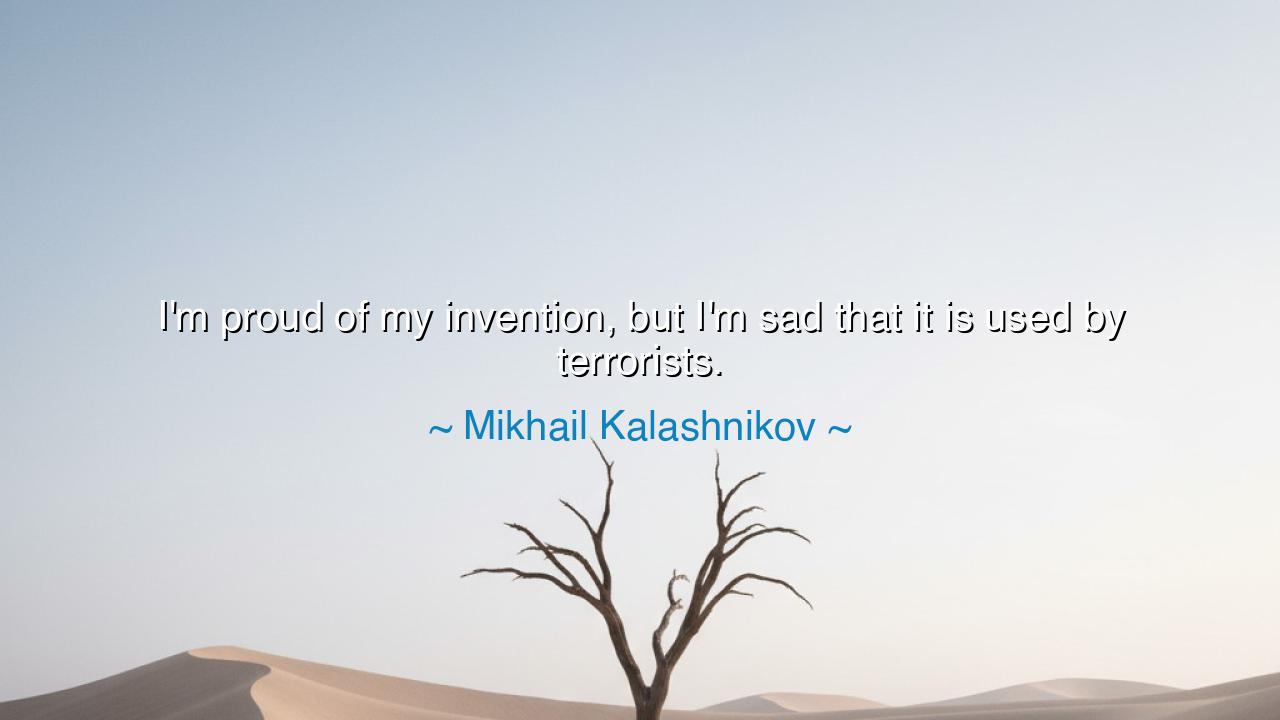
I'm proud of my invention, but I'm sad that it is used by






There is a haunting duality in the words of Mikhail Kalashnikov, the man who forged the most recognizable weapon of the modern age: "I'm proud of my invention, but I'm sad that it is used by terrorists." In this confession lies the eternal torment of the creator whose creation escapes his control. It is the sorrow of one who sought to serve his nation, yet witnessed his invention turned against the innocent. Beneath these words lies an ancient truth — that every act of creation, no matter how noble its intent, bears the shadow of how humanity chooses to wield it.
Kalashnikov was a soldier, born in the furnace of war. His invention, the AK-47, was born not from malice, but from necessity — a tool for defense, forged in the chaos of the Second World War. To him, it was a means to protect his people, to grant the ordinary soldier the strength to stand against tyranny. And yet, as time unfolded, that same invention spread across the world like wildfire — used by armies and rebels alike, by defenders and destroyers, by patriots and by terrorists. His pride in craftsmanship became tangled with guilt, his ingenuity shadowed by the suffering it unleashed.
This is not a new tragedy, but one as old as civilization itself. The ancients told of Prometheus, who stole fire from the gods to give to mankind — a gift of light, warmth, and progress. But that same fire, when untamed, became the instrument of destruction. Kalashnikov, like Prometheus, gave a tool meant for good, and watched humanity misuse it. His sadness echoes through the ages: the lament of those who create, only to see their work perverted by the darker side of human nature.
We might also recall Alfred Nobel, who invented dynamite to aid construction and mining — to build, not destroy. Yet his invention was soon weaponized, leaving devastation in its wake. Stricken with regret, Nobel spent his fortune to create the Nobel Peace Prize, a symbol of redemption and reconciliation. In Kalashnikov’s sorrow, we sense a similar yearning — the wish that what was meant for protection could instead have served peace. His pride was not arrogance; it was the satisfaction of an engineer whose design changed the world. His sadness was not weakness; it was the ache of conscience that comes when human progress forgets its purpose.
The origin of this quote lies in the moral weight of creation. Every inventor, every artist, every thinker must face the possibility that their work will outlive them — and be used in ways they cannot foresee. The sword once forged for justice may fall into the hands of a tyrant; the words once spoken for freedom may be twisted into propaganda. The greater the power of the creation, the greater the responsibility of the creator to shape hearts as well as tools. For what good is invention if humanity’s spirit remains unrefined?
Kalashnikov’s reflection, then, becomes not merely a lament of one man, but a warning to all who create: the power to build is always shadowed by the power to destroy. It is not enough to create with brilliance; one must create with conscience. The wise understand that the true measure of progress is not what we make, but how we use what is made. For invention without morality becomes chaos — as fire without restraint becomes ruin.
The lesson, my children, is clear and eternal: do not let your creations outrun your compassion. Whether you build with words, with machines, or with ideas, remember that every act of making carries the seed of consequence. Be proud of your craft, but humble in its power. Guard your gifts with wisdom, lest they become instruments of harm. The world does not need more invention alone — it needs invention guided by virtue.
And so, as we hear the voice of Mikhail Kalashnikov, we hear the echo of the ages: pride and sorrow, creation and destruction, forever intertwined. The true legacy of the inventor lies not in the weapon he built, but in the conscience he carried. May his sadness be our reminder — that every creation, like every soul, must serve the light, or else it will be claimed by the darkness it was meant to resist.






AAdministratorAdministrator
Welcome, honored guests. Please leave a comment, we will respond soon